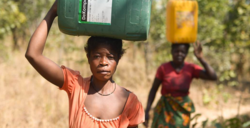Reuters | 15 November 2017
How commercial farms are ripping apart Zambian communities
How commercial farms are ripping apart Zambian communities
by Juliana Nnoko-Mewanu
Some commercial farmers in Zambia's have acquired thousands of hectares while ignoring laws meant to prevent forced evictions, writes Juliana Nnoko-Mewanu from Human Rights Watch
Zambian President Edgar Lungu recently reacted to news that commercial farms had forcibly evicted rural residents by insisting that investors properly compensate the displaced and “respect the rule of law”. But so far, no-one seems to be listening.
A broad range of investors, from corporate to family-run farms, have bought up farming land in Zambia, with plots ranging in size from 150 to more than 5,000 hectares. A new Human Rights Watch report found that some commercial farmers in Serenje District, in Zambia’s fertile Central Province, have acquired thousands of hectares of land while ignoring laws meant to prevent forced evictions and ensure that rural residents are compensated if their land is taken. While some farms have started operations without evicting residents, others have fired up their bulldozers and forcibly evicted residents whose families had farmed the land for generations.
Why have commercial farmers gotten away with this? There are many reasons, but a key one is the lack of a national land policy – which would set out how land is managed, what rights people have on the land they use, and how their rights are protected – and the law reforms that would result.
This week, a conference on land policy in Africa takes place in Addis Ababa. Zambian government officials will be there, and it’s imperative that delegates discuss how to protect rural communities from being evicted by commercial farming. When they return home, they should focus on adopting a national land policy that respects the rights of rural residents, and on helping those already displaced.
Our research found that hundreds of people have already been forced out of their homes and off their land by commercial farming in the area, with several thousand more at risk of eviction without a cent of compensation. This is devastating for the whole community, but particularly hard on women, who described their enormous struggles to sustain their families after losing fertile land for growing food, providing drinking water, and to use for hunting or foraging. Some complained about poor diet because they could no longer grow enough food, let alone put together meals that were nutritious. Mothers described stretching out single meals to last the whole day, or going hungry so their children could eat. Many had to trek long distances to find water. Many women also worried that being displaced meant losing their support networks, making it hard for them to find the time to farm.
Government officials say the land in Serenje district was long ago converted from customary status (where it is managed by traditional authorities) to state control, but this is news to locals, who say they did not know about the change and were definitely not consulted on it. Officials we spoke to also had no records to prove this claim.
Although laws require that affected communities are consulted on new projects that will impact them, most farm residents say consultations did not happen, or were so haphazard as to be meaningless. In many cases, any “negotiations” around compensation or resettlement were under duress, as commercial farmers threatened to bulldoze homes and crops if residents did not leave their homes. Many women said they did not take part in any negotiations, fearing violence.
Several commercial farmers told Human Rights Watch they had expected the government to remove people living on the farm plots they acquired. Instead, they said they had to decide how to deal with the families they found on the land, whom they regarded as “squatters” with no legitimate rights to the land, even those whose families had been there for generations.
Several government officials acknowledged problems with regulation of commercial agriculture and the existence of abuses, but did not take any responsibility for preventing or addressing them. Most officials pointed fingers at other agencies, sending the message that they didn’t consider protection of rural residents to be their job.
A new policy should clearly define and protect customary land tenure and the rights of women and men impacted by land-based investments, including commercial agriculture.
It’s clear that community members would welcome a clear and rights-respecting national land policy, but commercial farmers and government officials would also benefit.
And rural residents want the rule of law, too. They want it to protect them from losing their lands, homes, and livelihoods without due process. It’s time to deliver.
Juliana Nnoko-Mewanu is researcher on women and land at Human Rights Watch and author of a new report on the impact of commercial farming on Zambia’s rural poor.
* Any views expressed in this article are those of the author and not of Thomson Reuters Foundation.
* Any views expressed in this article are those of the author and not of Thomson Reuters Foundation.














